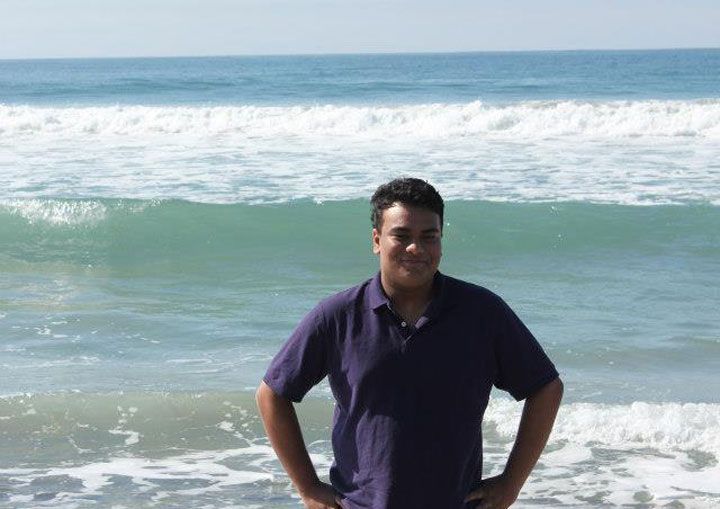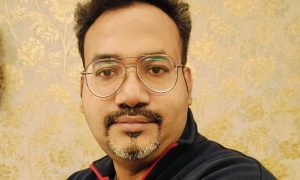Sandipan De is a student of NALSAR, Hyderabad, batch of 2015. He has earned three gold medals through his years of B.A. LL.B. He has secured internships with the likes of PwC, Khaitan & Co., CNBC TV 18, Argus Partners (formerly Udwadia Udeshi & Argus Partners), Talwar Thakore & Associates, and AZB & Partners. He also received the opportunity of signing a Training Contract with Allen & Overy, London. In this interview he talks about:
- Taking up varied internships and developing specific interest
- Securing a contract with Allen & Overy
- A typical workday at a Magic Circle law firm
Why did you decide to study Law? What inspired you to do so?
I was interested in commerce and business from a very early age. I remember I used to read the Economist, BusinessWeek and preferred the Economic Times over a normal daily. I think that built up my interest in the commercial world. The choice was between doing something finance related or commercial law. I had a flair for the language and logical reasoning. I thought law would best marry both my interests. Thus, law school happened.
What do you have to say about mooting at law school and legal writing for journals?
I have done only one moot- Vis. I think I might not be best suited to air my views about mooting but I genuinely feel that mooting as an activity is over hyped in Indian law schools. During my exchange semester at Santa Clara I figured that Indian law schools seem to privilege mooting over other activities but the sort of help, coaching and resources in foreign law schools is unmatched here in India. You should definitely try your hand at mooting but it isn’t the be all and end all of law school. The experience and learning is great but it isn’t something you can’t do without. I think legal writing and editorial positions are possibly very important. The sort of skills you develop there are extremely relevant and the reason why I tried my hand more at legal writing was because it let me delve into any area I wanted- topics that interest me as opposed to the confines of a set problem.
Tell us about your internship in the chamber of Senior Advocate, Saha & Ray Associates & IMS Learning Resources.
Well a bit of both to be honest. I wanted to try out the experience of litigation and see how a small law firm worked. I liked the experience and helped me decide that I did not see myself in litigation. Transactional practice was what I wanted. I have been teaching at IMS since my second year of law school. I really like this, as it keeps me in touch with the law aspirants and I enjoy teaching really bright students and try to advise them in making informed decisions.
Coal India Limited & CNBC TV 18 are unconventional internship choices. What went behind making those decisions?
I have to admit that by this time I was sure that I wanted to be in commercial law and had a sort of idea of what I wanted to do. I planned to see commercial law in action from every different facet possible. Commercial litigation, a behemoth PSU, etc. I interned with the only show that dealt with corporate law in India, while at CNBC, and that possibly was one of the best experiences during internships because of its unconventional nature.
What kind of exposure did you gain with PwC?
I worked with the in-house counsel’s team which was in the risk management vertical. Working with a Big Four was a different cultural experience and the risk management team was a whole new experience- it was about one client and trying to ensure best practices and the best risk management policies. I am not at liberty to divulge the sort of work I did but it was really interesting, tested your mettle and understanding of the business and involved coming up with best practice policies to guard against present and future liabilities.
What is a typical day like working at law firms?
AZB is still freshly etched in my memory. It was brilliant work. The work hours were exceptionally long but I enjoyed the thrill of working on India’s biggest transactions. It involved everything from simple research work to even trying your hand at drafting documents. I have to accept that the work I got from seniors was top-notch, they relied on you, gave you responsibility, expected you to put in the long hours but appreciated you for it. UU Argus was a relatively smaller environment and I really enjoyed the personal touch and the individual attention I got. Possibly, this is where I had completely made up my mind on transactional practice.
You were selected in the Winter Vacation Scheme of Allen & Overy. Our readers are very keen to know how the entire application process works and what they look for in a student when making selections?
After you get selected for the vacation scheme A&O is the only firm which gives Indian students the option of going for a winter scheme as opposed to the conventional summer scheme. The Magic Circle and Silver Circle firms come down to a select few law schools in India and interview the candidates for their vacation schemes (which are akin to an internship) after having shortlisted students on the basis of the application form which is released in July of fourth year through the RCC. Some law firms have more rounds after the application form including but not limited to critical reasoning and verbal reasoning tests. The interviews are usually sometime in September.
How was your experience in the UK working at Allen & Overy? How did you manage the finances and accommodation?
Finances and accommodation including travel are paid for by the firm. On top of that the firm pays you a weekly stipend. London is not just a great city but a financial, cultural and political capital. It is a thrilling experience to be working in the City of London (which is the financial district) and enjoying the thriving cultural life that London offers which is truly unparalleled. You are working in the world’s greatest financial centre on the biggest and best of deals- transactions that are FT headlines. A&O is a great place- possibly the friendliest of the Magic Circle firms, offers great quality work, exposure and training. Possibly, that is true for all of the MC firms but what really sets A&O apart is that they treat you as an individual, really care about you as a person, your career, future and training and the work atmosphere is collegiate. I never felt like ‘just an intern’. It was the best experience I had had and I was sure that if I was offered the TC A&O and London is where I wanted to be.
Tell us about your typical working day and the sort of work you were expected to do? How were your fellow co-interns?
I am presuming that you are asking about the A&O work during the vacation scheme. A standard day involved a commute on the famous London tube to work and reach ingoffice by 8:30 a.m. Put in half an hour of personal work (glancing through the FT, reading up on the topic for the client pitch exercise, mailing a couple of people to benefit from their expertise on a particular area, etc.). I would then carry out the tasks delegated to me by my Trainer, possibly meet my fellow vac schemers for coffee at eleven on the rooftop restaurant which gives you possibly one of the best views of the City and catch up on where we are with our client pitch exercise. Go back to my desk and continue with my allocated tasks. Usually there would be a networking lunch with different people drawn from diverse practices of the firm to know more about the practice areas and the firm in general. We would typically have a couple of talks scheduled by the HR, Partners, etc. during the afternoon which we would need to attend. Following that there would be that surprise drinks counter at the inhouse bar called Lavanda where you would grab a couple of drinks with your fellow vac schemers and catch up on the latest, know more about each other’s work in different departments and then head off to your accommodation unless you had a dinner or social event to attend. The dinners are usually at top-end restaurants and the social event would be really exciting stuff like ice skating at the Tower of London where you would be accompanied by your Trainer buddy and other young trainees at the firm with whom you can informally interact and they would give you informal advice and buy you a couple of drinks after a hard days’ work. You then get back to your accommodation and prepare for your interview or research for your group exercises and then try to catch some sleep to prepare for another exciting day ahead.
You are joining Allen & Overy after graduation. How did this work out? What would be your advice to those law students who want to secure such a contract?
After the vacation scheme you fill up a form for the Training Contract application and appear for an interview with a Recruitment Partner on your last day. Once you get back to India the HR will let you know the outcome within a week’s time. Be yourself. There is no one sort of personality that they are looking for. Technical competence is a given. The HR can look through if you are feigning interest and thus I would suggest that you venture down this road if you are really interested in commercial law and you know that this is your calling. Try your hand at everything in law school but keep yourself focussed. Be commercially aware. Very very aware. Do you apps very well so that your real personality is communicated through it. At the interview stage do not try to be a person you are not. I remember that a few people mentioned two so-called ‘tests’ that you need to pass- one is the client test and the other is ‘can we work with you test’. The latter is self explanatory and the former essentially points to whether the firm can put you in front of a client and can you hold your own. The other difference I have to highlight is that the foreign firms value a more holistic approach rather than just technical knowledge. As I said, technical competence is a given, client context and permeating a legal solution through a commercially viable idea is what is expected.
Any tips for an intern who wants to get noticed at work by dint of her performance?
Again, be yourself. Don’t try to be someone you are not. Work hard and network with people. Talk to people. Never be afraid to walk through someone’s door and ask for work. The worst that can happen is that person telling you that there is no work at present to delegate and you should ask someone else. Lawyers are a very intelligent crowd. Be a person whom people can work with. I would say know your politics, current affairs, music, etc. At the end of the day you need to be a person with whom everyone enjoys working with. You can spew all the jargon you want but hitting up a conversation with a person on a topic he is keenly interested in would cast a far deeper impression than knowing a particular SEBI regulation. Of course that too is important. (Remember the ‘can we work with you test’)
How well do you think your education at law school prepared you for real world practice? What do you feel about 5th year in the B.A. LL.B course at NLUs? Is it sufficiently utilized or needs a huge revamp?
I think the new academic model at NALSAR and the practical and industry oriented courses have really gone a long way in helping us prepare for the real world of practice. I have to thank the seniors and the informal mechanisms at NALSAR which are a sine qua non. I think all that forms a part of the legal education package. I like the idea of fifth year. Lot of partying to look forward to. I can’t speak for all NLU’s but the new model at NALSAR with single credit optionals on such varied subjects along with interesting opportunities like Teaching Assistantships are really exciting and I look forward to the last year of law school. I am TA-ing for Contracts and can’t wait to get back to college.
You were part of the RCC at your college. What prompted you to volunteer for it?
I am part of the RCC which is a peer-elected body as the placement process at NALSAR is completely student run. I wanted to run for the RCC because securing your job is important but if you can play a small part in facilitating your batchmates’ jobs- people whom you have literally lived with for the four years in law school- there is no satisfaction like that. The work involves negotiations with organisations, facilitating on-campus interviews, working in a team and trying to secure jobs for all. Involves drafting documents, making pitches, interacting with industry honchos, strategising and not so glorious tasks like running around getting tea, arranging desks and chairs, moving beds to arrange for interviews, etc. The experience is definitely worth it. I work with a great team of people in the RCC. I think the excellent Day Zero figures from NALSAR are a testament to that. I am proud to have a batch where everyone is behind the RCC and don’t just retire into their rooms and let the RCC do all the work. Plus, we have an extremely proactive and excellent administration who always have your back. My sincere hope is to see all my classmates placed as soon as possible.
Does being from one of the top three NLUs really come with additional perks?
Well, this might be controversial but I do believe that the top NLUs do have it better for their students. I think it is about getting an edge over others. However, it is not something that one can’t make up.
How important are grades in securing a job?
It is definitely important. It does get your foot in through the door but CGPA isn’t the only thing. At the end of the day once you are inside that interview room or in that internship it is your competence that matters and not just your gradesheet.
Any advice you would like to give to law students aspiring for a job at top law firms?
Go for it only if you really like commercial law. Try to understand the business and commercial angle to things. That makes it really interesting. Try to learn as much as you can. Contrary to the popular gyan on the topic no task is unimportant- even if you are doing a proofread you are getting the chance to see a document which you would have otherwise never seen. I would say put your mind to it try to understand the transaction, the clauses, ask questions. No one will mind if you are interested and ask questions about the work that they are doing. I think you should rather prepare from your first two years. Try to figure out early in the day where your interests lie. Whether it be commercial law, policy work, social justice or opening a restaurant- figure out early and work towards it from the beginning.
Lastly, what would be your message to our readers?
I had a great time at NALSAR over the past four years and made friends for a lifetime, had seniors that I would look up to forever, some of the greatest professors to whom I would be indebted to forever. Don’t lose yourself over CGPA and the proverbial ‘CV building’. Surely that is important but do enjoy law school. It is a unique experience. Very few careers in India offer you the sort of opportunities that law school does. Pay homage to the Old Monk, be intensely loyal to your university, make great friends, and have the time of your life.


























